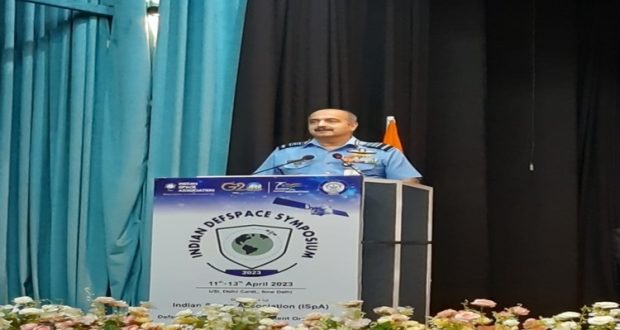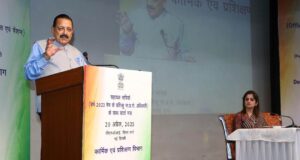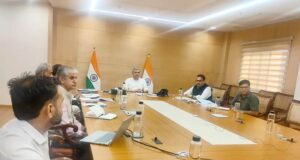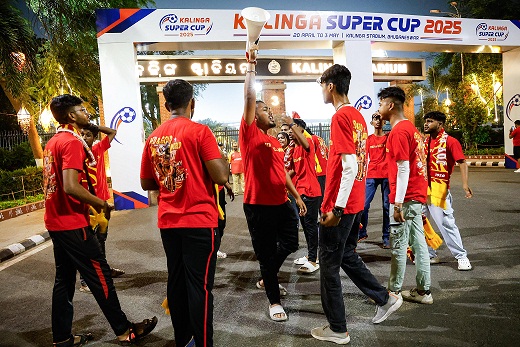Newdelhi:14/4/23:The three-day International Conference on Defence Finance and Economics (ICDFE-2023) concluded in New Delhi on April 14, 2023. Chief of the Air Staff Air Chief Marshal VR Chaudhari was the Chief Guest at the valedictory session of the conference. Financial Adviser (Defence Services) Smt Rasika Chaube, Additional CGDA Shri SG Dastidar and Senior Joint CGDAs Ms Devika Raghuvanshi & Shri AN Das were also present.
Raksha Mantri Shri Rajnath Singh had inaugurated the conference on April 12, 2023. Organised by Ministry of Defence (Finance), it witnessed participation of over 350 eminent policy makers, academics and government officials from within the country and abroad. Delegates from USA, UK, Japan, Australia, Sri Lanka, Bangladesh and Kenya attended the conference, across eight business sessions.
Discussions ranged from international perspective on strategic allocation of defence budget, the importance of human resource management in Defence and the significance of defence spending for a state’s national security. The panelists also discussed the defence finance perspective, including the significance of defence procurement and timely payments including the implementation of a faceless bill processing and payment system that the Defence Accounts Department is currently implementing.
The eminent speakers included Chief of Defence Staff General Anil Chauhan, Chief of the Naval Staff Admiral R Hari Kumar, Defence Secretary Shri Giridhar Aramane, Finance Secretary Shri TV Somanathan, Secretary (Ex-Servicemen Welfare) Shri Vijoy Kumar Singh, Secretary, Department of Defence R&D & Chairman DRDO Dr Samir V Kamat and Comptroller and Auditor General of India Shri Girish Chandra Murmu.
During the session ‘Defence Strategies & Economics’, the Chief of Defence Staff emphasised the necessity of aligning economic growth with defence spending. He advocated for civil military integration and financial discipline in the Armed Forces and urged for financial prudence in utilising the defence budget.
The Chief of the Naval Staff addressed a session on ‘Defence Diplomacy’. He emphasised its importance during ‘Amrit Kaal’ particularly in light of India hosting the G-20 Summit and the ensuing message of ‘Vasudhaive Kutumbakam’. He stressed the importance of defence diplomacy for India since it is well on course to become the fourth largest global economy soon.
During the session ‘Defence International Acquisition Issues’, the Defence Secretary highlighted the role of the defence sector in boosting economic growth and strategic autonomy as well as generating employment opportunities for India’s young population. He also discussed some of the challenges in Defence Acquisitions and urged the Ministry and the Defence Accounts Department to work towards optimal resource utilisation. The DRDO Chairman stressed on India’s growing self-reliance in the field of defence production over the last few years.
The business session on “Pay & Allowances and Veteran Welfare” featured a keynote address by Secretary (Ex-Servicemen Welfare), who described the main features of important schemes for veteran welfare, such as those run by Kendriya Sainik Board, ECHS, Pradhan Mantri Scholarship Scheme, Paraplegic Rehabilitation Board, War Memorial Hostels and others.
The Finance Secretary, in his address, discussed the optimal resource allocation in defence and emphasised on two aspects of it: how much budget should be allocated to defence and how to distribute the resources among different services, highlighting the need to take decisions based on practical considerations.
The Comptroller and Auditor General of India spoke about the challenges of meeting the developmental needs of India with limited financial resources and the need to prioritise various activities accordingly. He said that audit plays a vital role in ensuring accountability and transparency in defence management and helps in taking right decisions for achieving the security objectives of the country.
Ms Afroza Sultana Saleh, Sr Finance Controller of Defence Purchase at the Defence Finance Department of Bangladesh shared the Bangladesh Perspective on Defence Audit and Finance, the common shared history of the Departments across the Indian sub-continent. Maj Gen Sheikh Pasha Habib Uddin, DG, BIISS from Bangladesh elaborated on the changing role of Armed Forces over the years. His presentation touched upon various discourses about defence diplomacy and trends of defence diplomacy particularly in context of Bangladesh; and the way forward.
Dr Satoru Nagao from Hudson Institute, Tokyo shared his views on the international perspective on strategic allocation of defence budget. He drew upon historical lessons to evaluate the defence priorities and stressed the importance of making optimal resource mobilisation decisions.
An external perspective on how to allocate resources in defence effectively by identifying priorities and goals was provided by Mr Karl Dewey from IISS, UK. He also discussed the various changes in India’s Defence sector and highlighted the different aspects of India’s strategic vision. Mr Suyash Rai from Carnegie India, discussed the challenges of resource scarcity and the widening gap with China in terms of resources. He argued that India should pursue ‘Capabilities with efficiency’ – ‘Constraints but Capable’ as a guiding principle for its defence policy.
Mr Dhruva Kumar, from Curriculum Marine, Glasgow, UK shared his insights on four key challenges in Defence Acquisition process related with Transfer of Technology, Industrial and MoD capabilities, Supplier performances, incentive & contracting and Program management approach. Mr Alan Merbaum from the Defence Security Cooperation University, USA highlighted the significance of the collaboration between India and US as the oldest and largest democracies in the world and shared some insights into the US Defence sector and its acquisition process and suggested some best practices that India could adopt.
Mr Andrew Dowse from RAND Institute, Australia explained the Planning, Programming, Budgeting and Execution system of the USA and also described the Australian approach to defence resources planning.
Brig. Gen. Ahmad Mohammad (Retd.) from Kenya posed questions about the necessity of Pay and Allowances that are affordable, equitable, and dignified. He pointed out that each country has its own distinctive Military Pay and Allowances, and that the factors that make up the Pay and Allowances should vary according to each country. He shared the Kenyan experience and made factual comparisons with the Indian situation, urging policymakers to avoid the temptation to compare Military and Civilian Pay, emphasising that they have different demands and duties.
 Odisha news today, Latest Oriya News Bhubaneswar Online Odia news Portal
Odisha news today, Latest Oriya News Bhubaneswar Online Odia news Portal




